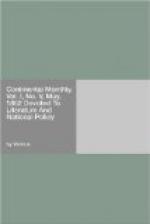It is certain that Mr. Bright would be a fearless and zealous reformer; it is doubtful whether he would not give place to others in the after-work. Well qualified to lead an enthusiastic faction to a crusade against precedent and authority, he has thus far failed to show himself capable of conducting an administration. Among the statesmen of modern times, honesty and enthusiasm are not qualities which control the policy of the state. Compare the crafty demeanor, the dubious expressions, the cautious statements of Earl Russell, with the plain, rude, blunt harangues of Mr. Bright, and we perceive the qualities which have elevated the former, and those which have kept the latter in the background. Lord Russell thinks what is for his interest to think; Mr. Bright thinks what that homely monitor, his conscience, urges on him. Lord Russell might adopt all the consequences of universal suffrage, and the principles of free trade, if he could still sit at the council-board, and dictate dispatches with a double meaning to foreign governments; but he fears to go beyond, though he nearly approaches, the line which separates the popular from the unpopular reformer. Expediency, on the contrary, forms no part of Mr. Bright’s creed; and, not being a scion of a noble and illustrious house, nor having attained a position in the state which might have made him a conservative, he has no hesitation in announcing his opinions in favor of universal suffrage and free trade, in opposition of a dominant aristocracy, and in defiance of a religious establishment, and dares with provoking coolness the retaliation of the great and powerful of the land.
Mr. Bright’s oratory is of a fresh, vigorous, and versatile character, and never fails to draw a multitude to the House when it is announced that he is to speak. Unlike the hesitating and timid delivery of Russell, the rapid jargon of Palmerston, the rich and graceful intonation of Gladstone, or the splendid sarcasm of Disraeli, his eloquence is bold, masculine, and ringing, and gives a better idea of intellectual




